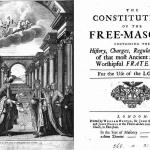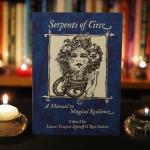One of my core memories of competing at International Mr. Leather was crystalized in an atrium of the host hotel. During a break from rehearsals, one of our judges was holding a group of us spellbound with tales of IMLs past, and she mentioned that one year, she’d moved the Bible in her nightstand while unpacking, only for a baggie of drugs to fall out of it.
No one really knew how to respond to that, until this big, burly, bearded dude pointed at me and announced, in a voice that carried, “I spanked him with a Bible last night.”
Conversations around the room scratched to a halt as everyone within earshot slowly turned to stare at me.
“Yeah,” I said. “He did.”
I never got the chance to read my ballots, but I did place surprisingly high in the overall rankings, and I would not be surprised if this moment had something to do with that. Point being, between growing up Episcopalian, graduating from a Catholic university, and exploring the improvisational nature of impact play, I am… intimately familiar with the Bible. So I feel comfortable contributing to the recent discussion on whether or not it’s an important resource for Pagans.
And my stance is that actually, yes: We would all do well to keep a Bible around. But only because it comes in super handy for witchcraft.

For almost as long as they’ve existed, the contents of the Bible have been staples in folk magic and folkloric witchcraft. Need a little spending money? Read Psalm 72 out loud three times and then mark the page with a dollar bill. Relationship crisis? Light pink candles while reciting the Song of Solomon. Assembling a protective charm? Add a miniature Bible to your components. Run afoul of an organized criminal syndicate? Write out Revelation 21:8 on a piece of paper and burn it with some dragon’s blood incense.
In Backwoods Witchcraft: Conjure & Folk Magic from Appalachia, author Jake Richards describes a method of calling rain using Scriptural passages, and there’s a very old folk practice of binding wounds with pages of the Bible to encourage faster healing. (Personally, I would disinfect the wound and bind it with sterile gauze first, then add a page of the Bible before wrapping the whole thing with an Ace bandage, but that’s just me.) Although all of the above does beg a question: If the majority of folk practitioners who incorporate the Bible into their work identify as Christian, can (or should) those of us from Pagan backgrounds utilize the Bible in our spellcraft?
And the answer is a resounding hell yeah, because chaos magic.
From a chaos magical perspective, the Bible is a source of power, if only because 2.4 billion people worldwide believe it to be powerful. And if folk practitioners have successfully used choice selections from the Bible to achieve specific magical results, it stands to reason that we can tap into that same power by mimicking those actions. The theory here is rooted in the concept of morphic resonance, which, on a base level, asserts that everything in existence has its own memory. So, for example, Obadiah 1:6 can be employed to find lost objects, for no other reason than people have, for any number of years, consistently employed it to find lost objects — the verse simply knows what to do and remembers how to do it, regardless of who happens to be putting it to work.
The only requirement on the part of the practitioner is the belief that the verse can do its job.

I’m also reminded of how most 12-Step meetings end with everyone holding hands in a circle and saying a prayer together, often the Lord’s Prayer. This is sometimes seen as controversial, since it could potentially alienate non-Christians, but as a devout — -one might even say professional — non-Christian, it never bothered me. What we were saying wasn’t as important to me as the symbology of what we were doing, which was reinforcing the fact that we were stronger in recovery as a group than as individuals. The words themselves didn’t matter — we honestly could’ve recited an article from Weekly World News in unison and gotten the same effect.
I take a similar approach to Bible magic as a Pagan and Chaos Witch. Whether or not I accept the existence of the Christian God or have any kind of relationship with Jesus or whatever is irrelevant: Where my belief needs to go is into the hypothesis that if following a given set of steps to reach a specific magical goal has worked for other practitioners, then it will work for me too. And reaching those goals will bolster my confidence in my abilities, which will promote the development of what I believe I can accomplish as a witch.
If we strip away all the trappings, the Bible is just a book, and like any book, it can be used as a tool or a weapon (or a paddle). How we choose to use it — or whether we choose to use it at all — is entirely up to us, but it definitely should not be discounted as a magical resource. As we often say in recovery, either out loud or to ourselves, “Take what works and leave the rest.” Within the realm of chaos magic, this goes for the Bible as much as anything else.


















